
Oceans-Switzerland
Scope & Guideline
Exploring the Depths of Oceanic Knowledge
Introduction
Aims and Scopes
- Marine Biodiversity and Conservation:
Research on marine species, their habitats, interactions, and conservation strategies, particularly focusing on coral reefs, marine mammals, and fish communities. - Oceanographic Processes:
Studies examining physical, chemical, and biological processes in marine environments, including hydrodynamics, nutrient cycling, and the impacts of climate change. - Ecotoxicology and Pollution:
Investigations into the effects of pollutants, such as plastics and pharmaceuticals, on marine life and ecosystems, including studies on bioaccumulation and health impacts. - Climate Change Impacts:
Research assessing the effects of climate change on marine ecosystems, including temperature changes, ocean acidification, and extreme weather events. - Marine Resource Management:
Studies aimed at improving the management of marine resources, including fisheries and habitat restoration, often with a focus on sustainable practices.
Trending and Emerging
- Impact of Climate Change on Marine Ecosystems:
An increasing number of studies focus on the direct effects of climate change on marine organisms and ecosystems, including coral bleaching events, shifts in species distributions, and resilience strategies. - Microplastic Pollution and Marine Life:
Research on microplastics and their interactions with marine organisms is gaining traction, reflecting growing concerns over pollution and its ecological consequences. - Technological Innovations in Marine Research:
There is a rising trend in the use of advanced technologies, such as autonomous observing systems and hyperspectral imaging, to enhance data collection and analysis in marine environments. - Ecosystem-Based Management Strategies:
Emerging studies emphasize the importance of ecosystem-based management approaches that integrate ecological, social, and economic factors for sustainable marine resource use. - Marine Health and Disease Studies:
Increased attention is being paid to the health and disease dynamics of marine species, particularly in the context of anthropogenic stresses and emerging pathogens.
Declining or Waning
- Traditional Fisheries Management:
Research focused on conventional fisheries management practices has decreased as the field pivots towards more integrated and ecosystem-based approaches. - Static Habitat Studies:
Studies that primarily focus on static, isolated habitats without considering dynamic interactions within broader ecological contexts are less common as integrative approaches gain traction. - Historical Marine Ecology:
While still important, there has been a noticeable decline in research solely focused on historical perspectives of marine ecosystems, as contemporary issues and real-time data become more critical.
Similar Journals
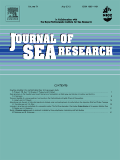
JOURNAL OF SEA RESEARCH
Unveiling the Mysteries of Our OceansJOURNAL OF SEA RESEARCH, published by Elsevier, is a premier academic journal dedicated to advancing knowledge in the fields of aquatic science, ecology, and oceanography. Since its inception in 1996, this journal has provided a vital platform for researchers and professionals to disseminate groundbreaking findings and promote fostering interdisciplinary discussions. With its impressive Q2 ranking in multiple categories, including Aquatic Science and Ecology, Evolution, Behavior and Systematics, it positions itself as a significant contributor to marine and environmental studies. The journal is accessible in both print (ISSN: 1385-1101) and online formats (E-ISSN: 1873-1414), ensuring wide reach and engagement within the scholarly community. Researchers and students alike will find the journal not only a reliable source of information but also a source of inspiration for future explorations. With a commitment to quality and a broad scope that spans fundamental to applied research, JOURNAL OF SEA RESEARCH remains an indispensable resource for understanding the complexities of marine environments and their relevance to our changing world.

BULLETIN OF MARINE SCIENCE
Advancing marine knowledge for a sustainable future.BULLETIN OF MARINE SCIENCE, published by Rosenstiel School of Marine and Atmospheric Science, is a prominent journal dedicated to advancing the field of marine science through scholarly research and peer-reviewed articles. With an ISSN of 0007-4977 and an E-ISSN of 1553-6955, this journal has been contributing to significant scientific discourse since its inception in 1973. Covering a wide spectrum of topics in aquatic sciences and oceanography, it has maintained a respectable position in the academic community, as evidenced by its Q3 ranking in both categories for 2023. Although currently not an open-access journal, it provides essential access to groundbreaking research that informs marine conservation, ecological studies, and atmospheric sciences. Situated in the United States at 4600 Rickenbacker Causeway, Miami, FL 33149, the journal serves as a vital resource for researchers, professionals, and students seeking to engage with the latest findings in marine science and foster a deeper understanding of our oceans.
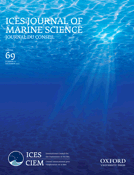
ICES JOURNAL OF MARINE SCIENCE
Exploring the Depths of Marine KnowledgeThe ICES Journal of Marine Science, published by Oxford University Press, stands at the forefront of marine research, offering cutting-edge insights into aquatic sciences and oceanography since its inception in 1903. With its ISSN 1054-3139 and E-ISSN 1095-9289, this esteemed journal has garnered a reputation for excellence, evidenced by its Q1 rankings in categories such as Aquatic Science, Ecology, and Oceanography as of 2023. The journal's commitment to advancing knowledge in marine systems makes it an essential resource for researchers, professionals, and students alike, who are keen to explore the intricate ecosystems that sustain our planet. Without an open access model, the journal maintains a rigorous editorial standard and is recognized among the top journals, ranking impressively in various Scopus categories. Authored contributions reflect pioneering research that informs policy and fosters sustainable practices, making this journal a critical platform for disseminating marine science knowledge.

CORAL REEFS
Driving Insights into Coral Reef ManagementCORAL REEFS is a prestigious academic journal dedicated to advancing the understanding of coral reef ecosystems and promoting research in aquatic science. Published by SPRINGER, this journal has established itself as a leading platform in the field, with an impressive impact, ranked in the top quartile (Q1) for Aquatic Science in 2023. With its comprehensive focus, CORAL REEFS covers a wide array of topics, including ecology, conservation, and management of coral reefs, making it an essential resource for researchers, professionals, and students alike. The journal has been in continuous publication since 1982 and aims to foster collaboration and innovation among the global scientific community. Although not open access, access options are available through institutional subscriptions, enhancing the dissemination of groundbreaking research. The journal stands out for its contribution to understanding the complex dynamics of aquatic systems, solidifying its role in guiding future research and policy in marine conservation.
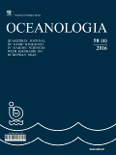
OCEANOLOGIA
Pioneering Insights in Ocean EngineeringOCEANOLOGIA, a distinguished academic journal published by the Polish Academy of Sciences, Institute of Oceanology, serves as a pivotal platform for researchers and professionals in the fields of Aquatic Science, Oceanography, and Ocean Engineering. Established in 1973 and transitioning to Open Access in 2011, this peer-reviewed journal promotes the dissemination of high-quality research across its diverse scope of ocean-related topics, aligning with its commitment to advancing marine science. With a notable impact factor underscored by its positioning in the Q1 and Q2 quartiles of recognized categories, OCEANOLOGIA stands out with impressive Scopus Rankings, including 49/247 in Aquatic Science and 24/105 in Ocean Engineering, reflecting its significance in the global research landscape. The journal's dedication to publishing cutting-edge studies ensures that it continues to influence both academic discourse and practical applications in ocean-related fields, making it an essential resource for students, researchers, and professionals aiming to contribute to the advancement of oceanic studies.

Ocean and Coastal Research
Bridging science and sustainability in oceanography.Ocean and Coastal Research, published by the Institute Oceanográfico of the University of São Paulo, is an essential academic journal dedicated to advancing the fields of Aquatic Science, Oceanography, and Water Science and Technology. Established in 2020, the journal has quickly become a noteworthy platform contributing to the understanding and sustainable management of marine and coastal ecosystems, with an open access model that promotes the dissemination of critical research findings. Although currently categorized in the fourth quartile across its respective fields in 2023, the journal serves as an emerging repository of valuable insights for researchers, professionals, and students alike, aiming to make impactful discoveries that address contemporary challenges in ocean conservation and resource management. The journal's editorial team is committed to fostering interdisciplinary collaboration and upholding rigorous peer-review standards, thereby ensuring high-quality contributions that reflect the dynamic nature of marine science. With an E-ISSN of 2675-2824, all access to published articles is freely available, supporting global research efforts addressing crucial environmental issues.
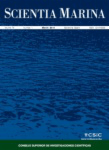
SCIENTIA MARINA
Connecting Scholars to the Wonders of the SeaSCIENTIA MARINA, an esteemed journal published by the Consejo Superior Investigaciones Cientificas (CSIC) in Spain, focuses on critical studies within the fields of Aquatic Science and Oceanography. With an Open Access policy since its inception in 1998, this journal facilitates widespread dissemination of research findings, significantly enhancing accessibility for researchers, professionals, and students alike. Currently, SCIENTIA MARINA holds a Q3 ranking in both categories for 2023, demonstrating its commitment to advancing knowledge in marine and aquatic environments. With a convergence of research years from 1996 to 2024, it remains a pivotal platform for innovative research, encompassing various aspects of marine biology, ecology, and environmental science. The journal serves as an essential resource for scholars aiming to contribute to the understanding and preservation of marine ecosystems.

Journal of Marine Science and Technology-Taiwan
Exploring the depths of marine science and technology.The Journal of Marine Science and Technology-Taiwan, published by Nant Taiwan Ocean University, is a pivotal academic platform dedicated to the advancement of knowledge in the fields of marine science and engineering. With an ISSN of 1023-2796 and E-ISSN 2709-6998, this journal spans a wide array of topics relevant to the study and application of marine technology from 1998 to 2024. It ranks in the Q3 quartile in major categories such as Mechanical Engineering, Mechanics of Materials, and Ocean Engineering, illustrating its growing influence and the breadth of research it encompasses. Although currently not an open access journal, it provides critical insights to researchers, professionals, and students alike, making significant contributions to the understanding of marine environments and technologies. As the journal continues to evolve, its commitment to high-quality, impactful research remains central to its mission, empowering scholars to drive innovation in the dynamic field of marine science.
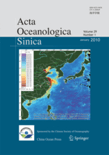
ACTA OCEANOLOGICA SINICA
Bridging Research and Marine ConservationACTA OCEANOLOGICA SINICA, published by SPRINGER, stands as a significant voice in the fields of Aquatic Science and Oceanography, contributing vital research and insights since its inception in 1985. With an ISSN of 0253-505X and an E-ISSN of 1869-1099, this journal maintains a strong international focus, delivering high-quality peer-reviewed articles that address pressing marine and freshwater environmental issues. Although it operates under a subscription model, its Q3 ranking in both Aquatic Science and Oceanography demonstrates its solid standing within Scopus, placing it in the 48th and 44th percentiles respectively. The journal aims to foster knowledge exchange and collaboration among researchers, professionals, and students by providing a platform for innovative studies and comprehensive reviews. With a dedicated editorial board and a commitment to advancing scientific understanding, ACTA OCEANOLOGICA SINICA serves as an essential resource for anyone engaged in the study of oceanographic phenomena and aquatic ecosystems.
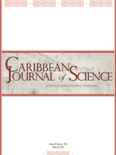
CARIBBEAN JOURNAL OF SCIENCE
Unveiling multidisciplinary insights from the Caribbean region.Caribbean Journal of Science, published by the University of Puerto Rico, serves as a crucial platform for disseminating innovative research in the field of science across the Caribbean region. With an ISSN of 0008-6452, this journal captures the essence of multidisciplinary studies, ranking 47 out of 111 in its category, showcasing a 58th percentile within Scopus. Although it doesn't currently offer Open Access, it has extended its academic reach since its inception in 1980, fostering collaboration and knowledge growth among researchers, professionals, and students alike. The journal covers an expansive range of scientific disciplines and continues to be a vital resource for those seeking to engage with and contribute to the scientific landscape of the Caribbean. For anyone dedicated to advancing scientific inquiry and practice in this vibrant region, the Caribbean Journal of Science represents an invaluable asset.